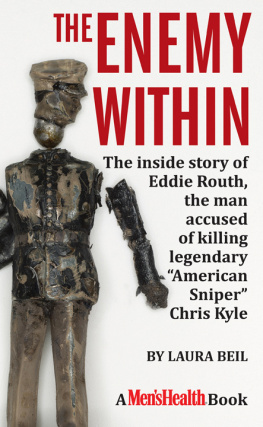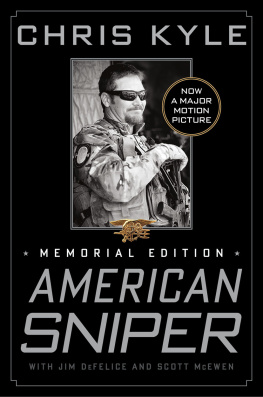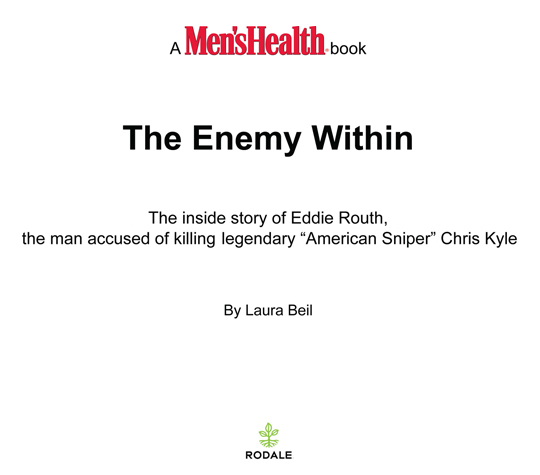February 2, 2013, 6 P.M., Midlothian, Texas
Listen to the the 9-1-1 emergency call placed by Laura Blevins, the sister of the Eddie Routh, shortly after the Iraq war veteran leaves her home in Midlothian, Texas.
There is audio content at this location that is not currently supported for your device.
9-1-1, what is your emergency?
Listen, my brother just came by here...He told me that hes committed a murder.
Okay. Hold on.
Im terrified for my life.
Okay. Hold on.
I dont know if hes going to come back here...
Whats his name, and what did he leave in?
His name is Eddie Routh...
How do you spell his last name?
R-o-u-t-h.
Okay. Can you come up here to the police station?
[cries] Yes, maam, I can right now. Im sorry. Im really scared.
Okay.
Now listen, I dont know if hes being honest with me...
What is your name, maam?
My name is Laura Blevins.
Okay. And who did he say he had killed?
He said that he killed two guys. They went out to the shooting range. Like hes all crazy. Hes fucking psychotic.
Is he on drugs?
Im sorry for my language.
No, youre...
I dont know if hes on drugs or not...my husband is going to talk to you because Im so nervous.
[mans voice] Hello.
Yes. Go ahead and tell me what he said.
He said he killed two guys at a shooting range. He took one of their trucks, like a dark blue or maybe black F-250.
Okay.
And he drove off, and Im not sure where he went.
So hes in the F-250 right now?
Yes. He said there are two guns in his truck as well.
Okay. And do we know what shooting range he was talking about?
He didnt say...
All right. Did he make any threats towards yall?
No, he didnt. I didnt perceive anything as a threat, but he was talking kinda babble.
Do yall think hes been drinking or [using] any drugs? Is he known to do that in the past?
Yeah. Hes been known to drink in the past... He was recently diagnosed with PTSD.
With what?
PTSD...post-traumatic stress disorder.
Okay. Okay.
And hes been acting a little weird from that. He just got out of a mental hospital actually...
M ORE T HAN T WO Y EARS E ARLIER
The first time Jodi Routh first started to really worry about her son Eddie, the family was on a camping trip to Colorado in July 2010. Camping trips to Parry Peak, near Independence Pass, had been a family tradition since Eddie was 3. Almost every summer, convoys of aunts, uncles, and cousins followed Highway 287 out of the Dallas County heat, pitched tents under thick ponderosa pines, and cast their fishing lines into the water.
That July, Eddie had just left the Marines as a corporal, ending a four-year military career. Tall, with piercing green eyes and dark hair, hed enlisted before his senior year in 2006. Less than two weeks after graduating from Midlothian High School, he arrived for basic training at Marine Corps Recruit Depot, San Diego.
Following tours in Iraq and post-tsunami Haiti, Eddie had seen enough of active duty. He told his mom he wanted to make up for missed time with his family before finding a job. He longed for Parry Peak and the uncomplicated joy he had known there as a kid.
Along on the trip were Eddies parents, his sister Laura and her family, and an aunt and uncle with their 12-year-old son, who had spent a good bit of his life worshiping his Marine cousin. The group had made camp near a postcard-perfect bridge spanning a river swollen with fresh snowmelt. One afternoon, they decided to pose for photographs on the bridge.
Eddie had spent the day communing with a case of beer. A drinker since his teens, some days now he washed down his breakfast with Miller. Jodi nagged him about it more than she liked, but figured that alcohol cushioned her sons reentry into civilian life. During the photo session by the water, someone passed Eddies niece to his young cousin. Seeing the baby near a backdrop of dangerous current, Eddie exploded, screaming at the boy, accusing him of nearly dropping her.
We were saying, Eddie, were all right here. Stop it. Were fine. Shes fine. Were all okay, Jodi recalls. Still, his fears that the baby was sure to drown squeezed out all other thoughts. Outbursts flared throughout the evening, until finally Eddie fell to the ground in heaving sobs.
This was the deflection point in Jodi Rouths life, the start of witnessing Eddies mind retreat further into his own darkness. As the following months and years passed, his family carted him to and from the Dallas Veterans Administration (VA) Medical Center, where he amassed a medical record that would eventually reach almost 500 pages. And still, his symptoms gripped tighter. In desperation one day in late January 2013, Jodi approached Chris Kyle, the legendary Navy SEAL who had two children attending the school where Jodi worked as special education aide. Kyles celebrity had risen in 2012 with the publication of his autobiography, American Sniper, chronicling his years as the militarys most accomplished rifleman, with 160 confirmed kills during his four tours in Iraq. Kyles memoir became a New York Times bestseller. Leveraging his fame, Kyle had made it his mission to help rebuild wounded soldiers, largely through partnering with the company FITCO Fitness to provide gym equipment to disabled vets.
One morning in January 2013 in the car drop off line, Jodi leaned in through the door of Kyles black, souped-up Ford F-350, introduced herself, and asked him if Eddie might be eligible for the FITCO program. He told her to put Eddies name and number in the backpack of one of his children. To her surprise, Kyle, concerned, showed up at the school a few hours later. Im going to do everything in my power to help your son, he told her as they hugged goodbye. She wept in relief. It was the first time shed heard anyone apart from family say they truly wanted to help Eddie.
That meeting set in motion the events that brought Kyle, his friend Chad Littlefield, and Eddie together on a firing range at Rough Creek Lodge, a high-end North Texas resort, on February 2. And there, police say, the most lethal sniper in military history was shot dead by an enemy he never saw coming. Littlefields body lay nearby. When Eddie arrived at his sisters house early that evening driving Kyles truck, he told his brother-in-law, according an affidavit, he couldnt trust them, so he killed them before they could kill him.
The System
For more than two years after Eddies fury at Parry Peak, his family sought help the only way they knew, through the Veterans Health Administration. They found themselves adrift in a system struggling to meet demand, brought on by a decade of war and the aging veterans of past conflicts. A U.S. Senate committee reported in 2011 that 40 percent of mental-health-care providers couldnt schedule an appointment for a new patient within the mandated two-week window, while 70 percent said they did not have enough staff or space to do their jobs. In Dallas, the VA psychiatric ward was briefly closed to admissions in 2008, after too many veterans in its care took their own lives.
Each day, on average, 22 returning soldiers commit suicide, according to a VA report issued early this year. But here is the paradox: The government is in fact pouring record funding into treating post-traumatic stress disorder (PTSD)$432 million projected this year, up 40 percent just from 2009. To help explain why a disturbing number of veterans still fall through the cracks, some experts offer an explanation as unpopular as it is politically radioactive: Clinics are clogged with too many veterans who dont need to be there, siphoning resources from those, like Eddie, who do.















